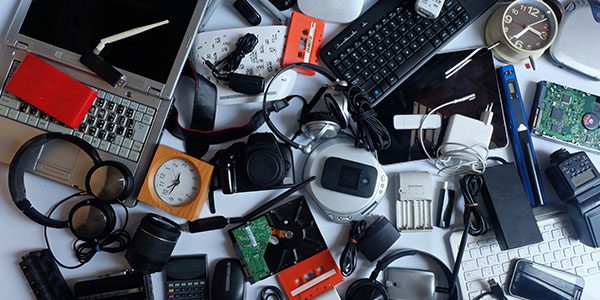Partner with R2 Certification Recyclers: Safeguard Data and Secure the Environment
Wiki Article
Elevate Your E-Waste Monitoring With R2 Certification: an Extensive Review
One trick approach to boost e-waste management methods is by acquiring R2 certification. By exploring the advantages and processes connected with R2 qualification, a deeper understanding of how it can revolutionize e-waste monitoring approaches arises, dropping light on a course in the direction of sustainability and ethical disposal methods.Importance of E-Waste Management

When e-waste is not taken care of correctly, these toxic substances can leak into the environment, causing damage to wildlife and possibly getting in the food chain, presenting dangers to human wellness. Moreover, the improper disposal of e-waste adds to pollution and greenhouse gas emissions, aggravating environment change and ecological destruction.

Benefits of R2 Accreditation

Firstly, R2 accreditation improves integrity by showcasing a company's devotion to sustainable practices. It guarantees clients, companions, and stakeholders that the company follows strict criteria for e-waste administration - r2 certification. This reputation can bring about enhanced count on and enhanced relationships with clients who focus on ecological duty
Second of all, R2 accreditation aids alleviate risks associated with inappropriate e-waste disposal. By following the stringent standards stated by the accreditation, organizations can decrease the possibility of data violations, ecological contamination, and lawful repercussions. This positive method safeguards the business's track record and decreases prospective liabilities.
Lastly, R2 accreditation shows a dedication to environmental stewardship - r2 certification. By sensibly handling digital waste with accredited procedures, companies add to the preservation of resources, reduction of contamination, and promo of a round economic climate. This commitment not only benefits the atmosphere however likewise aligns with evolving consumer expectations for sustainable service practices
R2 Accreditation Process Summary
Having established the advantages of R2 certification in promoting reputation, danger mitigation, and environmental stewardship, it is vital to currently outline the in-depth procedure associated with acquiring this accreditation. The R2 certification procedure begins with an extensive evaluation of the organization's operational policies and procedures to ensure compliance with the R2 criterion. This preliminary assessment is important in recognizing any kind of spaces that need to be resolved prior to continuing better.As soon as the organization's methods straighten with the R2 conventional demands, an independent third-party auditor performs an on-site audit to examine the application and effectiveness of these methods. This audit includes a thorough testimonial of paperwork, interviews with team, and physical evaluations of centers to validate compliance.
Complying with a successful audit, the company receives a qualification decision based on the auditor's searchings for. If authorized, the company is approved R2 qualification, showing its commitment to responsible e-waste administration. It is necessary to note that keeping R2 certification needs recurring compliance with the criterion's needs and routine audits to make certain ongoing adherence to finest techniques in e-waste recycling and disposal.
Key Criteria for R2 Conformity
An essential aspect of accomplishing R2 compliance is making certain that all electronic waste (e-waste) processing facilities fulfill strict environmental and security standards. To follow R2 demands, organizations have to stick to key requirements weblink that focus on liable e-waste monitoring techniques. These criteria consist of applying a documented ecological, wellness, and safety management system, guaranteeing the safe and secure handling of data-containing tools, and performing detailed downstream due diligence to track the last destination of e-waste materials.Moreover, R2 compliance demands the proper testing, refurbishment, and recycling of electronic equipment to extend its useful life and lessen ecological influence. Facilities seeking R2 accreditation need to likewise prioritize worker health and wellness by providing necessary training, personal protective tools, and a safe functioning setting. Furthermore, maintaining thorough records of e-waste processing tasks and frequently undertaking audits by certified licensing bodies are crucial parts of showing recurring conformity with R2 criteria.
Impacts of Sustainable E-Waste Practices
The application of sustainable e-waste practices in conformity with R2 conformity not just guarantees environmental and security standards are met but additionally substantially impacts the general lifecycle of electronic products. By adhering to R2 criteria, electronic waste monitoring processes become extra reliable, minimizing the ecological impact of digital products. Lasting e-waste techniques help with the appropriate disposal of digital elements, ensuring that unsafe products are dealt with responsibly and do not end up contaminating find out the environment.Furthermore, lasting e-waste practices can add to work production in the recycling and refurbishment industries, promoting financial development while promoting ecological responsibility. In general, the adoption of sustainable e-waste practices under R2 qualification serves as a critical action in the direction of attaining a much more ecologically sustainable electronics industry.
Conclusion
Finally, applying proper e-waste administration practices is critical for environmental sustainability and source conservation. R2 qualification plays a key role in making certain responsible handling and disposal of click here to find out more electronic waste. By adhering to the strict requirements set forth by R2 criteria, companies can not only decrease their ecological influence however also contribute to a more lasting future for generations to come.One key technique to boost e-waste monitoring techniques is by obtaining R2 accreditation. By discovering the processes and advantages associated with R2 accreditation, a much deeper understanding of just how it can reinvent e-waste administration methods emerges, shedding light on a path in the direction of sustainability and moral disposal practices.
The R2 accreditation procedure starts with a thorough review of the company's functional policies and procedures to ensure conformity with the R2 criterion. If approved, the company is granted R2 accreditation, showing its dedication to liable e-waste management. On the whole, the fostering of sustainable e-waste methods under R2 qualification offers as an important action towards accomplishing a much more eco sustainable electronics sector.
Report this wiki page